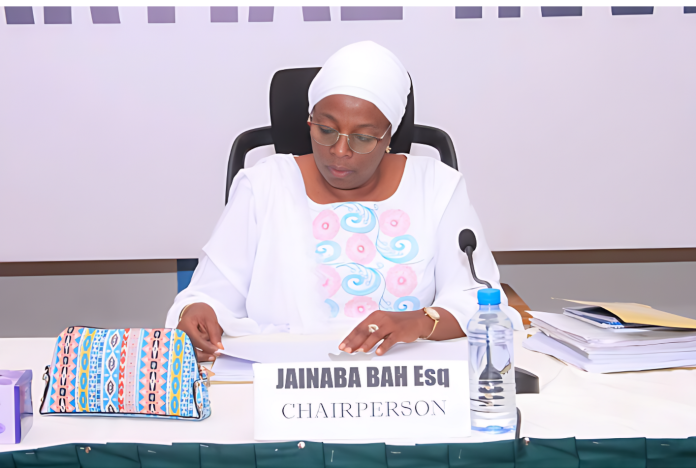By Makutu Manneh
Dr. Alieu Keita, the Finance Director of the Kanifing Municipal Council (KMC) testified before the Commission of Inquiry into Local Government Councils that the ‘Mbalit’ Project of the Kanifing Municipal Council is being conducted at the disadvantage of the council.
It was Dr Keita’s second day of appearance before the Commission. The Commission is established to conduct investigations into the administrative and financial conduct of local government councils between May 2018 and January 2023 to enhance transparency and accountability.
‘Mbalit’ Project is a local name for the Kanifing Municipal Council’s procurement of trucks for waste collection. It is a multi-million dalasi project. The finance director observed the project about the Council being put at a disadvantage.
“When I went through the agreement of the project, the mode of servicing of the ‘Mbalit’ project was so complicated that I never wanted AGIB to take advantage of the council,” he said.
Dr Alieu Keita said the ‘Mbalit’ Project was to the disadvantage of the Council. He described the project as an ‘Unusual Project’ and a “highly complicated” one. He said the arrangements for the “Mbalit Project” did not favour the Council.
Dr Keita said he reviewed the contract looking at the details including the collaterals and other securities in place as well as the terms of payment.
“I was trying to assess how much interest should be paid and the duration of the loan but couldn’t put the pieces together so I don’t want to get involved. I left it alone,” he said.
He added that the project could be best described as a special agreement between KMC and AGIB Bank because the garbage trucks were probably used as collateral.
He said after reviewing the contract, he approached Mayor Talib Bensouda and told him that the banks were taking advantage of the council and there was need to review the Project to save money for the Council.
“I wanted to save the council some money and make sure they were not overcharged,” Dr Keita said.
“The Mayor told me to back off. He asked me to leave it as it is,” the Director of Finance added.
He told the Commission that he didn’t want to be involved in the ‘Mbalit’ project because he was not present when it started. Counsel Patrick Gomez told him he does not have the discretion so he has to talk about it as the Director of Finance.
The witness said monies were taken from the KMC main accounts plus the revenue generated from the Mbalit Project to pay the loan because the money generated from the “Mbalit” service alone could not pay the loan. He added that the payment was made to AGIB Bank in the Mbalit Account.
Mbalit Project, the witness stated in his written statement dated 4 May 2023 that the mode of servicing the loan for the project was “unusual”.
“The agreement was highly complicated,” Keita said.
“It was a special agreement between AGIB and the Council. The guarantors were used as collateral. I wanted to save the council some money and I wanted to ensure that they were not overcharged,” he said.
He stated that ‘Everything was at their (AGIB and ESPACE Motors) advantage’ while the Council was at a disadvantage.
The witness said he was not involved in the Mbalit Project. He added that his former deputy Sheriff Njie has all the documentation.
“Only a few people have access to the documentation,” the witness said.
He said he, as the director of finance, does not have access to the documents regarding the ‘Mbalit’ Project.
The witness did not provide more details of the ‘Mbalit Project’ as he said the project was complicated.
“What was complicated?” Gomez asked.
“It is not the normal loan that I know of that banks give out. It was a special arrangement between the Council and Espace Motors. It is not normal,” the witness said.
The law (Finance and Audit Act) requires that the council shall keep a development account from which revenue generated is deposited and from which liabilities are paid. Section 3 provides that “A council shall keep a council development fund into which all revenue generated by the council shall be paid and from which all liabilities falling to be discharged by the council shall be discharged.”
The witness said KMC has about 3 main accounts. He added that the KMC did not operate in line with the dictates of the law in terms of maintaining bank accounts. He admitted that they did not comply with the law. The witness further admitted that the Local Government Finance and Audit Act is binding on them.
The Commission requested him to provide all the documents related to the Mbalit Project under his position.
On how the assessment of revenue is done at the KMC, the witness said this is done by assessing how much revenue is collected daily, weekly and monthly for them to project for the year. He stated that they do not do all-round assessments by going around the municipality.
He said property owners are expected to come to the Council to register their properties, but most of them do not want to pay rates. He added that sometimes they do not even want to reveal all their properties.
Witness Keita said this makes it difficult for the Council in trying to know and have the contacts of all the property owners within KM.
Counsel Gomez told him that is why, in addition to the register, they are expected to do further assessment.
“Yes. That is why just recently , a few weeks ago – I assigned all the rate collectors to go into their zones and make sure they register all the properties because there might be new properties that have not been in the system,” Keita said.
The witness said he was preparing monthly bank reconciliations every month, saying he was very concerned about that because he wanted to know the bank transactions.
Witness Kieta continued to s ay that he once had a problem with Mega Bank because they were not able to reconcile with them. He explained that the bank entered credit and at the same time debited the KMC account without explaining.
The commission instructed him to provide them with all the bank reconciliation he has done during his tenure as finance director.
Witness Keita said he also prepares financial statements at the end of every year and quarterly income statements. He was requested to bring all related documents.
On the issue of loans, he said when he joined the council there was no loan scheme because there was an embargo.
“They do give salary advances. I found it happening at the KMC and it was approved by the CEO,” he said.
He maintained that KMC did not take loans from any financial institutions when he joined the council.
He gave an interesting explanation regarding how supervisors collect arrears from property owners. He stated that they would go round and collect the money, bring the cash to the council, and obtain receipts which they take back to the property owners. He added that they were doing this without cash books.
Lead Counsel Patrick Gomez referred to section 903 of the Financial Manual. It is titled Subsidiary Cash Book. It provides that it is the cash book to be used by employees charged with the receipt of revenue and who are required to make lodgement to the Main Cashier at Council Headquarters. The cash book should record the serial numbers of the receipts, tickets, licenses, etc., and the amounts received from the public, on the day of receipt.
After reading this provision, the witness said they were using a computerised system. Lead Counsel Gomez told him irrespective of any system used, the law requires them to use cash books. Gomez referred the witness to section 914 of the manual, which is about computerised accounting system. The witness could not dispute this.
“The law said they must maintain a cash book,” Lead Counsel Gomez said.
“Yes,” the witness answered.
“If they do not maintain cash books and they are receiving revenue, will that not be open to fraudulent activities,” Gomez said.
“Of course, anybody handling cash must have a cash book,” the witness replied.
The public hearing will continue on Monday.




















